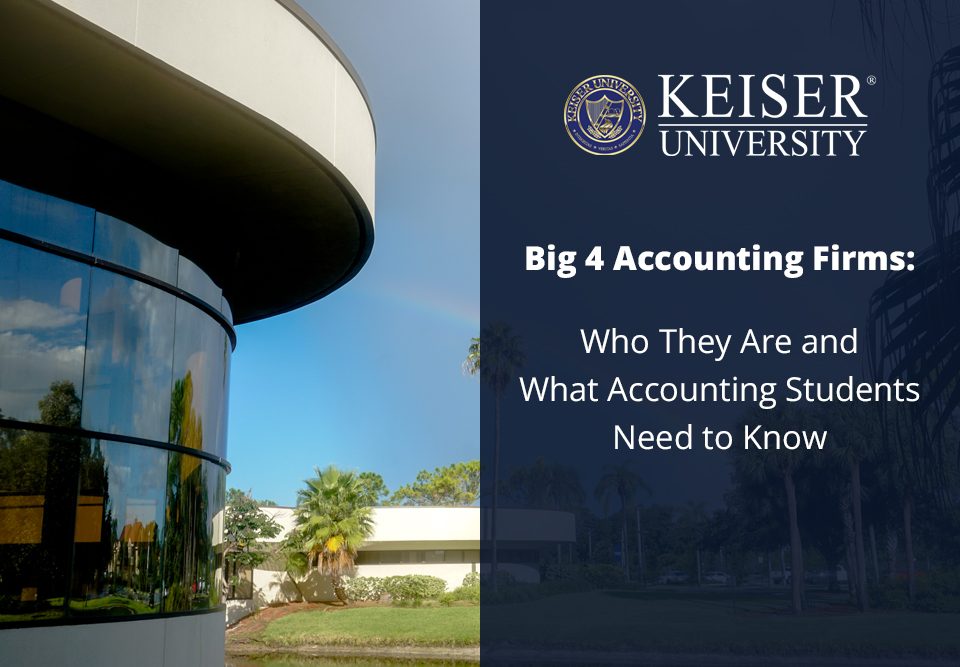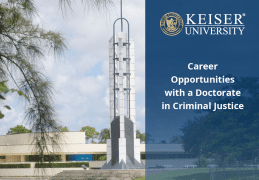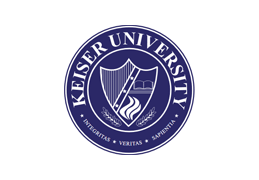Perhaps securing a position at one of the large accounting companies, big 4 accounting firms, is a lifelong goal of yours, or maybe you are just beginning to explore your career options at a public company in the finance or accounting industry. Keiser University has career path options for you as you explore the big 4 accounting firms.
While there are CPA firms and accounting companies of all shapes and sizes across the country, few compare to the Big 4 accounting firms. These four accounting firms are well-known enough to be household names — even among those not actively involved in the accounting industry.
If you are looking to dive into the dynamic world of accounting, now is the best time to get to know the Big Four accounting firms.
What Is The Big 4 In Accounting
The Big 4 are global conglomerates that specialize in professional services far beyond traditional accounting. The primary and most recognized service for Big 4 firms is external audit, where they aim to provide an independent opinion on a company’s financial statements.
Beyond audit, these firms offer a vast suite of other services. Tax divisions assist multinational corporations and advisory & consulting teams provide expert guidance on everything from cybersecurity to risk management. An employee’s career path often begins in one service line, like audit, before potentially specializing or moving into a consulting role, making these firms powerful incubators of business talent.
Who Are the Big Four Accounting Firms?
The Big 4 accounting firms are the largest accounting firms in the world, as measured by the amount of revenue earned annually. Among accounting graduates, these companies are seen as some of the best places to work in the accounting industry. As a result, the job market is highly competitive, requiring accounting and finance professionals to pursue additional educational and career opportunities to set themselves apart from other applicants.
Who Were the Big 8 Accounting Firms?
According to Investopedia, at one time, the largest accounting companies in the country were referred to as the Big 8. These firms were Arthur Andersen; Coopers & Lybrand; Deloitte, Haskins & Sells; Ernst & Whinney, Peat Marwick Mitchell; Price Waterhouse; Touche Ross; and Arthur Young. A wave of major mergers in 1989 altered the landscape, reducing the group to the “Big 6.Finally, thanks to a series of mergers and acquisitions, they have been whittled down to the Big 4 Firms.
The Big 4 accounting firms include Deloitte, PricewaterhouseCoopers, Klynveld Peat Marwick Goerdeler, and Ernst & Young.
1. Deloitte
At the top of the Big 4 is Deloitte, the world’s largest accounting firm that has 415,000 employees. In 2022, according to Statista, Deloitte grossed its highest annual revenue ever, earning more than $59 billion across all four service streams. The company is headquartered in London, England, and currently overseen by Global Chief Executive Officer Joseph B. Ucuzoglu.
Founders
Deloitte was founded in 1845 by William Welch Deloitte as a small accountancy firm in London — at a time when England was on the verge of industrialization and the need for qualified accountants was greater than ever. As a young professional in a vibrant city on the precipice of great change, William Deloitte had the connections necessary to expand his business and firm. He oversaw the growth of the company, which grew to include more than 70 employees and became one of the most successful accounting firms in 19th-century London.
History
Over the span of nearly two centuries, Deloitte grew from an independent accountancy firm in England to the largest accounting company in the United States. Deloitte (along with other key players in the 19th-century accounting industry) worked to create accounting firms that offered public accounting services, defining the role of accounting in the modern world. These same firms continued to grow and develop in the era of income tax, which first began at the turn of the 20th century. As the Great Depression and World War II reshaped personal finance and economics for a large swath of the country, the firms adapted to the needs of clients. Mergers and acquisitions throughout the latter half of the 20th century ensured that Deloitte was prepared to embrace the changes of the Information Age, and it has continued to be one of the most successful accounting firms of the 21st century.
Mergers and Acquisitions
Deloitte, as it exists today, is the result of dozens of mergers and acquisitions throughout the years. Currently, the company consists of a variety of professional service networks that have agreed to adhere to the brand standards and ethics of the Deloitte name.
Services Provided and Industries
Deloitte offers four main service streams:
- Audit and risk advisory
- Consulting
- Tax
- Financial advisory
Of all its service streams, consulting generates the most revenue for Deloitte. In 2022, consulting services brought in more than $25.8 billion in company revenue.
About The Deloitte Logo
The signature green dot at the end of the wordmark has become synonymous with the company and its mission. The green dot was introduced during a transitional period in the organization’s history. Over time, the green dot has become a recognized symbol of the Deloitte brand, contributing to a consistent identity and brand unity.
2. PricewaterhouseCoopers (PwC)
Behind Deloitte is PricewaterhouseCoopers, globally known as the second-largest professional services network. Currently, PwC has an international reach that expands across 152 countries and employs nearly 328,000 individuals. In 2022 alone, more than 148,000 people joined the company. Revenue topped $50.3 billion at the end of Fiscal Year 2022, but growth was not as substantial for the company as it was for other Big Four accounting firms. Headquartered in London, the company is currently led by Chair Robert Moritz.
Founders
The founders of the company include 19th-century accountants Samuel Lowell Price and William Cooper. The two were key players in London’s accounting scene — both of whom likely never imagined that their forces would be combined to yield one of the largest accounting firms in the world in the span of just more than a century.
History
Today, PwC is the result of a merger in 1998 between Price Waterhouse and Coopers & Lybrand. However, the company is rooted in a commitment of integrity that spans back to the Industrial Era in England. The blended history of these two firms tells a story of determination and resilience over the course of significant social and technological change.
Samuel Lowell Price first established his London accounting firm in 1849 in London, and by 1865, the firm had grown to include two partners. It was then known as Price, Holyland and Waterhouse; within a decade, it would become Price, Waterhouse & Co. It wasn’t until 1982 that this independent accounting firm became a global company, known as Price Waterhouse World.
Not long after Price established his firm in London, William Cooper created his own accounting firm in 1854, which would be known as Cooper Brothers within a few years. For a century, Cooper Brothers established a reputation of excellence in the local area, and by 1957, it merged with several other large firms to form Coopers & Lybrand.
Mergers and Acquisitions
In its current form, PwC is the result of many different mergers and acquisitions over the years. The key mergers and acquisitions that created this professional services network include:
- A 1990 merger between Coopers & Lybrand and Deloitte Haskins & Sells in various countries worldwide
- The key 1998 merger between Coopers & Lybrand and Price Waterhouse to create PricewaterhouseCoopers
- The 2002 sale of PricewaterhouseCoopers Consulting to IBM
Services Provided and Industries
PwC works with large organizations as well as individuals to provide Assurance, Tax and Auditory services. Heavily relied upon by some of the most recognized companies around the world, PwC is known as a brand that can be trusted in the accounting field. In 2022, PwC provided service in some form to more than 84 percent of the Fortune 500 companies around the globe.
3. Klynveld Peat Marwick Goerdeler (KPMG)
Operating in more than 143 countries around the world and boasting offices in every single U.S. state, Klynveld Peat Marwick Goerdeler is another of the Big Four accounting firms. Known worldwide as KPMG, this company has offices in more than 143 countries and employs more than 265,000 people. In 2022, KPMG grew its revenue by more than 14 percent, ultimately grossing $35 billion throughout the fiscal year. Revenue increased across nearly all service streams, including advisory, auditory services and tax and legal services. The company is headquartered in the Netherlands and currently overseen by Global Chairman and CEO Bill Thomas.
Founders
Like many of the other Big Four accounting firms, the founders of KPMG played a critical role in the accounting profession’s development in the 19th century. The four founders of KPMG are considered to be William Barclay Peat, James Marwick, Piet Klynveld and Reinhard Goerdeler.
History
The history of KPMG can be traced back to its four so-called founding fathers, who each made their mark on the field of accounting in their own time and place. William Barclay Peat began his career as an accountant at age 17 and worked his way up to a leadership position at his firm, eventually renaming it William Barclay Peat & Co. in 1891. Across the ocean, James Marwick was working to establish an accounting firm in New York City, where the profession was not welcomed with open arms. A few decades later, Piet Klynveld opened a small accounting firm in 1917 in the Netherlands, and by 1946, he had transformed it into the largest firm of its kind in the country. It was not until 1953 that Reinhard Goerdeler came into the picture, when he became part of Deutsche Treuhand-Gesselschaft, or DTG.
Mergers and Acquisitions
Mergers and acquisitions throughout the past century have led to the formation of KPMG as it exists today. The first significant merger occurred in the company’s early years. In 1911 during a chance encounter on a trans-Atlantic voyage, Peat and Marwick happened to meet each other. By the end of their journey, they had formed a plan to become Peat, Marwick, Mitchell & Co.
By the 1970s and 1980s, things began changing rapidly again. In 1978, Peat, Marwick, Mitchell & Co. became Peat Marwick International. Just a year later in 1979, Klynveld Kraayenhof & Co. merged with DTG and McLintock Main Lafrentz to become Klynveld Main Goerdeler.
It was only a decade later that PMI and KMG merged together, bringing KPMG into existence in 1987. At the time, this mega-merger was known as the largest of its kind in the accounting field.
Services Provided and Industries
Similar to other Big Four accounting firms, KPMG provides advisory services, tax and legal services and audit services. KPMG works with an array of industries, including asset management, banking and capital markets, consumer and retail, building and construction and more.
4. Ernst & Young (EY)
With more than 300,000 employees in 150 countries around the globe, Ernst & Young is considered one of the Big Four accounting firms. In 2022, EY earned more than $45 billion in revenue, an increase of nearly 14 percent from the previous year. The company is headquartered in London and currently led by Global CEO and Chairman Carmine Di Sibio.
Founders
While the company has a complex history that includes a series of mergers and acquisitions, the founders are often considered Alwin C. Ernst and Arthur Young. Both Ernst and Young started accounting firms at the turn of the 20th century and formed key partnerships that helped their firms grow into major players in their respective areas.
History
The path toward the company that exists today began in the early 1900s, when two aspiring accountants started firms at a similar time. In 1903, Alwin C. Ernst began an accounting firm with his brother in Cleveland, Ohio. Just three years later in 1906, Arthur Young started his firm, Arthur Young & Co., in nearby Chicago, Illinois. The two firms found themselves allied with British accounting firms within a few short decades, allowing them both to grow and prosper.
Mergers and Acquisitions
A series of mergers and acquisitions in the latter half of the 20th century led to the formation of Ernst & Young as it stands today. In 1979, Ernst & Ernst merged with Whinney Smith & Whinney, becoming Ernst & Whinney. At the time, this merger represented the formation of the fourth-largest accounting firm in the world.
In just 10 years, in 1989, Ernst & Whinney merged with Arthur Young & Co., becoming the Ernst & Young that is known today.
Services Provided and Industries
Ernst & Young offers four distinct service lines for its clients, including assurance, consulting, strategy and transactions and tax. It is known for its multidisciplinary teams that provide innovative solutions catering to the complexities of today’s global economy. Ernst & Young works with clients in a variety of industries, that include government, energy, private capital and finance.
Elevate Your Education to Meet the Demands of the Accounting Industry
No matter where you are in your career, it’s important to recognize that elevating your education with an advanced degree program will only bring you closer to those professional aspirations.
At Keiser University Graduate School, we offer a wide range of accounting and finance degree programs that are rooted in academia yet driven forward by a skills-based approach to education. From our MBA in Accounting to Master of Accountancy (MAcc), we have program options that can align with your interests and professional goals. Request more information about our graduate school programs today.






 The instructors at Keiser University impacted my life. They believed in my ability to become a great graphic designer, regardless of how I felt about my skills. KU helped to prepare me for the real world and got me to where I am today.
The instructors at Keiser University impacted my life. They believed in my ability to become a great graphic designer, regardless of how I felt about my skills. KU helped to prepare me for the real world and got me to where I am today.
